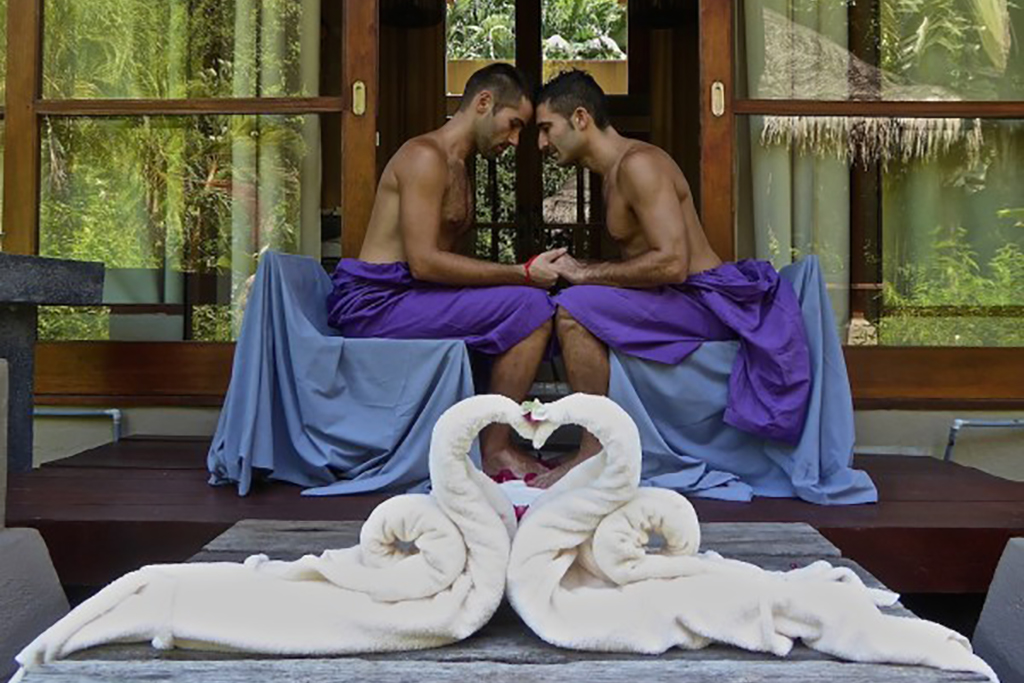PASSPORT Magazine welcomes the Nomadic Boys, Stefan and Sebastien, as Global Correspondents to our website. Their travels and experiences around the world are an inspiration to LGBT people everywhere. Their adventures together epitomize what two people can accomplish with curiosity, creativity, and a love for life and each other.
Join them as they travel and discover
WHAT’S IT LIKE TRAVELING AS A GAY COUPLE IN ASIA?
“Why should I spend my tourist dollars in a country that wants to throw me in jail?!”
This was our dilemma before setting off for our big travel adventures in Asia – as a gay couple.
If it isn’t illegal (like in Sri Lanka, Singapore, the Maldives, Malaysia, India, Myanmar…), then it’s certainly not truly welcomed (think Indonesia, China or Mongolia).
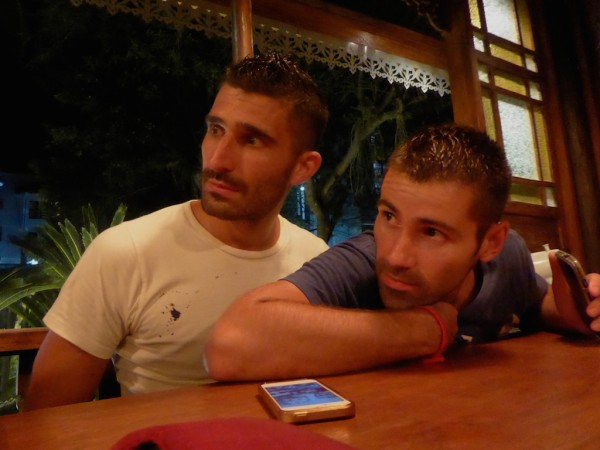
Will you welcome this gay couple into your country?
A few (like Nepal and Vietnam) have taken proactive steps to start to protect their LGBT community instead of criminalising them.
And some have gone further to not only protect their LGBT community, but to embrace, support them and in addition, actively promote gay tourism: Japan, Thailand, Taiwan and the Philippines.
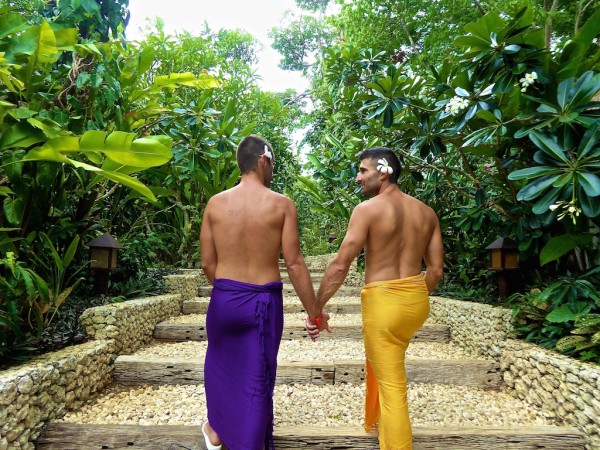
The Mandala Spa on Boracay island in the Philippines used our image to promote their Rainbow Romance package
So as a gay traveller, does that mean you shouldn’t visit countries like India or Myanmar? Are you really under any practical danger visiting a country like Malaysia or the Maldives? Should you take that hard line approach and avoid visiting some of the most beautiful areas of our planet just because of some really archaic, backwards laws?
After over 18 months travelling as a gay couple in Asia, here’s a few lessons we learnt and hope we can relay to all gay travellers in this post:
- Ignore the anti-gay laws: as a foreigner you are completely safe!
- This is because it’s one rule for locals, another for tourists.
- Despite anti-gay laws, it IS ethical to spend money in these countries.
- Going out there as a tourist is more effective to their LGBT community then a blanket ban on visiting.
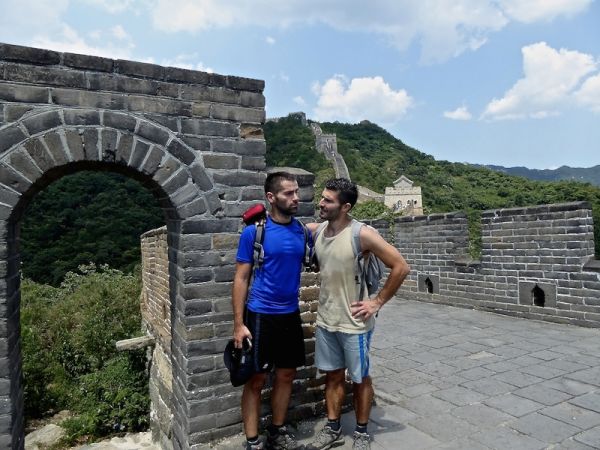
The Nomadic Boys at the Great Wall of China
#1 Ignore the anti-gay laws: as a foreigner you are completely safe!
One common opinion we found in every single country we visited: most people just couldn’t care less about you. Not in a bad way of course. Their priorities are their jobs, family, paying their bills, educating their children, putting food on the table.
No one heterosexual was ever interested in what the Nomadic Boys got up to in the bedroom (or bathtub…!):
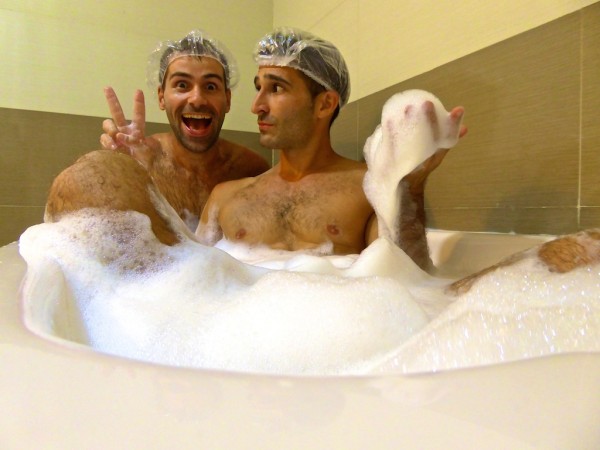
What could the Nomadic Boys possibly be doing behind closed doors? (Bath fun in Hue, Central Vietnam)
At no stage during our travels in Asia did we ever feel threatened or in danger for being gay.
At worst, the gay club we went to in Delhi was busted by the police at 1am. The policemen were using the anti gay laws to get a bribe from the club promoters. Everyone else was left alone and told to leave via the back door.
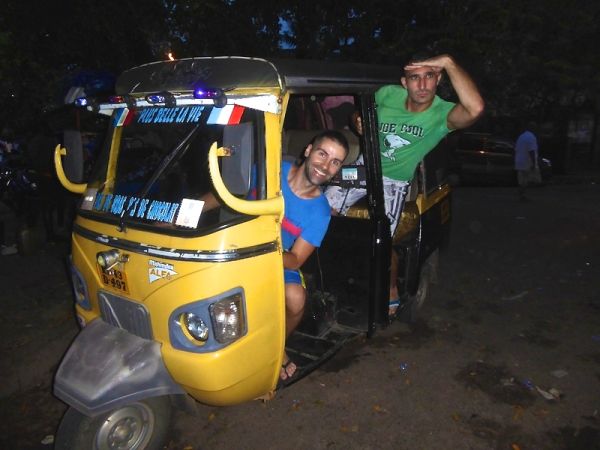
Look out for those corrupt police in India…any excuse for a bribe!
We are not obviously gay when you first meet us, we don’t mince about waving a rainbow flag, nor do we show any public displays of affection like holding hands or kissing (we don’t do this anyway back home in London/Lyon).
At the very worst, we got the whole “double bed – are you sure?!” or “are you twins/brothers?” type of questions a lot.
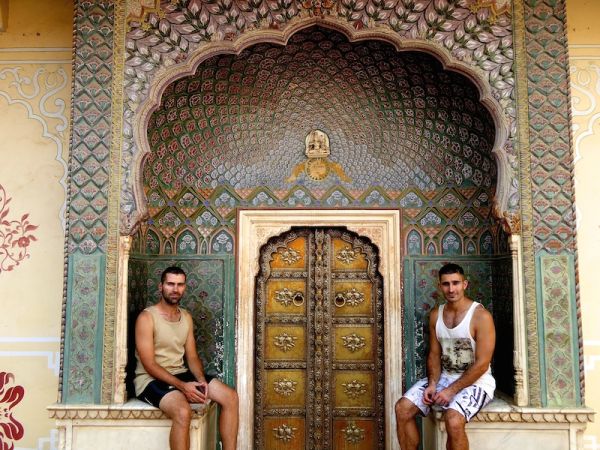
Do we really look like brothers? Posing at Jaipur’s City Palace in Northern India
#2 One rule for locals, another for tourists
In every country we visited in Asia, gay tourists are always treated differently compared to LGBT locals.
Our friend Kaluu from Colombo pointed out that whilst homosexuality is illegal in Sri Lanka, the police almost always turn a blind eye to tourists: no one wants to get involved with foreign embassies if it ever came to that.
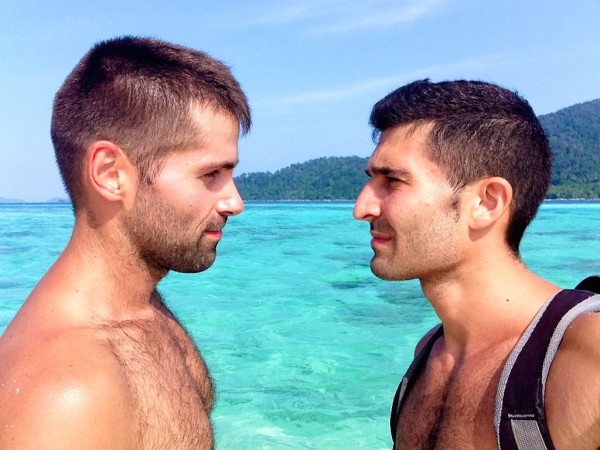
Will the Sri Lankan police turn a blind eye if they caught this stolen kiss on Mirissa beach?
In Malaysia, we met many gay locals, really excited to show us round. However, they asked us to not use their name on our blog for fear of negative implications on their work and by their society.
Yet the hotels we worked with throughout Malaysia were delighted to embrace and welcome us as a gay couple and promote pink tourism, like The Four Seasons on Langkawi island who arranged this lovers ritual ceremony for us:
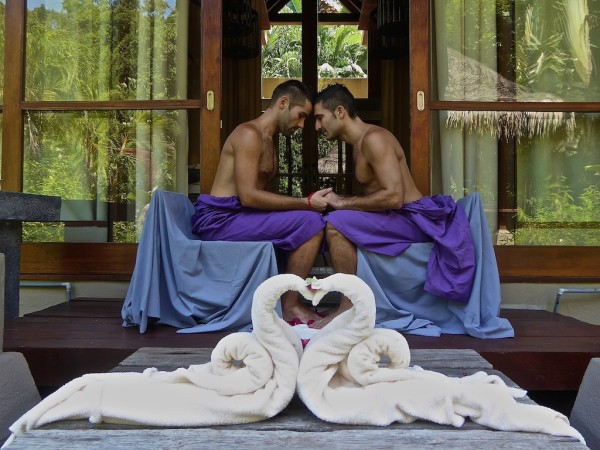
Part of the lover’s ritual following our massage at the Four Seasons Langkawi spa in Malaysia
Tourism is big business, so foreigners will always be given special treatment despite the homophobic laws.
The only exception is Brunei: a tiny country on Borneo island, which is financially independent, funded by oil, so no interest in tourism. And also the autonomous Aceh province in North Indonesia.
In both Brunei and Aceh, extreme Sharia Law applies, so both gay locals and LGBT tourists risk some form of public whipping and/or death by stoning.
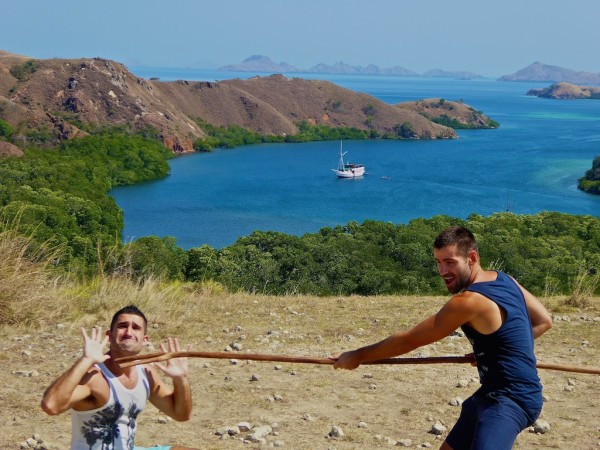
“BAD GAY BOY STEFAN! THAT’S 100 LASHES!” Sebastien demonstrating some of the subtleties of Sharia Law
#3 Despite anti-gay laws, it IS ethical to spend money in these countries
Is it ethical to spend money in countries which criminalise their LGBT communities?
We say a big fat yes of course!
We have been criticised for promoting LGBT travel to countries like the Maldives, Malaysia, Sri Lanka etc, but we always question the true value of a blanket ban on gay tourists visiting such countries.
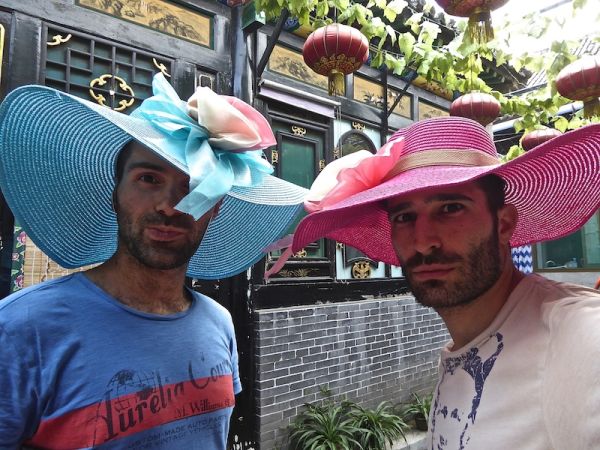
We say bring on the gay tourism to all of Asia!
The money you spend on holiday mainly goes to the local businesses you are eating at, staying at or touring with.
In other words, the people benefiting are every day people like you and me (maybe straight, maybe gay), who simply want to make a living for themselves, and not the politicians who are creating and promoting anti gay laws.
In most cases, these local businesses probably don’t even agree or care for these laws.
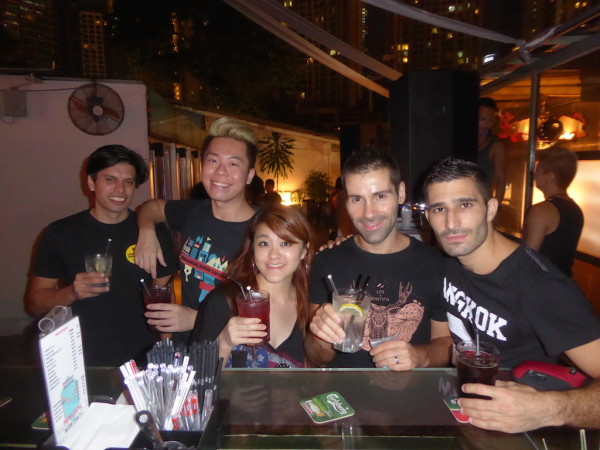
Gay life in Kuala Lumpur continues to strive at Marketplace‘s gay night every Saturday despite Malaysia’s anti-gay laws
Most importantly of all, if you visit a gay owned or gay friendly establishment during your travels, your money helps them flourish in a society, which is likely to be fighting to close them down or make their lives difficult.
Your presence there is invaluable in supporting the local LGBT community and businesses, as well as helping them flourish.
And finally, we strongly believe that meeting and engaging with gay locals is far more productive then refusing to visit their country in the first place.
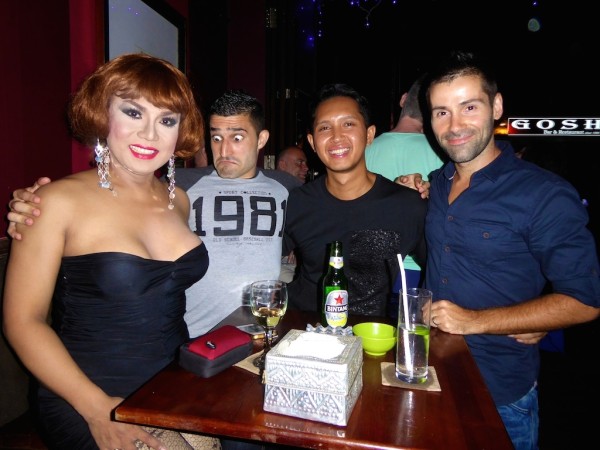
Embracing our new friends at Bali Joe gay bar in Bali, Indonesia
#4 So go on and book your flight to Delhi, Male, Colombo etc
We strongly believe boycotting a country like India, Malaysia, Myanmar, the Maldives, Sri Lanka etc is counter productive.
Actually going out there and supporting LGBT owned businesses and making friends and interacting with the local LGBT community is far more effective then boycotting their country.
Imagine you were in their shoes, would you prefer your gay sisters abroad to ignore you, or come over and embrace and support you?
We sure know what we’d choose.
And you’ll make heaps of friends along the way!
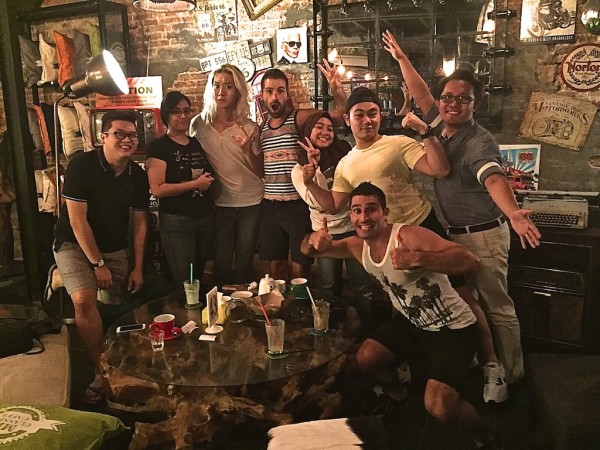
Hanging out with our friends in Kuching, Sarawak on the Malaysian side of Borneo island
You can read more about Stefan and Sebastien on their gay travel blog</.


